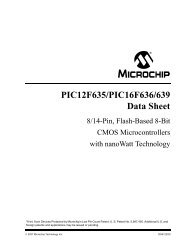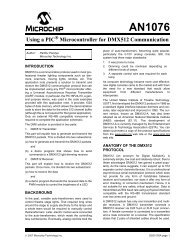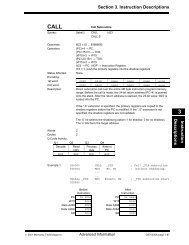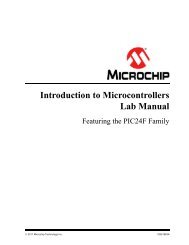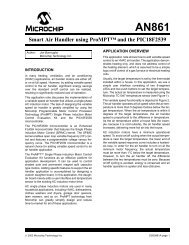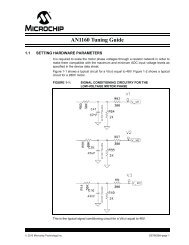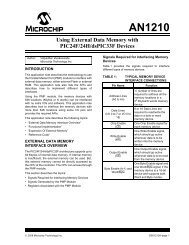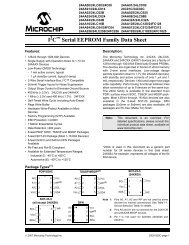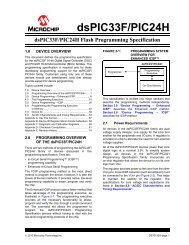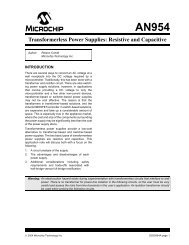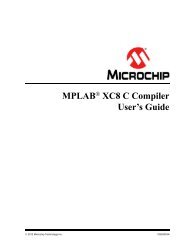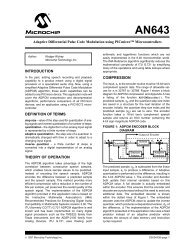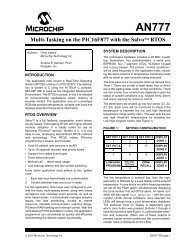MPLAB C Compiler for PIC24 MCUs and dsPIC DSCs ... - Microchip
MPLAB C Compiler for PIC24 MCUs and dsPIC DSCs ... - Microchip
MPLAB C Compiler for PIC24 MCUs and dsPIC DSCs ... - Microchip
Create successful ePaper yourself
Turn your PDF publications into a flip-book with our unique Google optimized e-Paper software.
16-Bit C <strong>Compiler</strong> User’s Guide<br />
8.3 WRITING AN INTERRUPT SERVICE ROUTINE<br />
Following the guidelines in this section, you can write all of your application code,<br />
including your interrupt service routines, using only C language constructs.<br />
8.3.1 Guidelines <strong>for</strong> Writing ISR’s<br />
The guidelines <strong>for</strong> writing ISR’s are:<br />
• declare ISR’s with no parameters <strong>and</strong> a void return type (m<strong>and</strong>atory)<br />
• do not let ISR’s be called by main line code (m<strong>and</strong>atory)<br />
• do not let ISR’s call other functions (recommended)<br />
A 16-bit device ISR is like any other C function in that it can have local variables <strong>and</strong><br />
access global variables. However, an ISR needs to be declared with no parameters<br />
<strong>and</strong> no return value. This is necessary because the ISR, in response to a hardware<br />
interrupt or trap, is invoked asynchronously to the mainline C program (that is, it is not<br />
called in the normal way, so parameters <strong>and</strong> return values don’t apply).<br />
ISR’s should only be invoked through a hardware interrupt or trap <strong>and</strong> not from other<br />
C functions. An ISR uses the return from interrupt (RETFIE) instruction to exit from the<br />
function rather than the normal RETURN instruction. Using a RETFIE instruction out of<br />
context can corrupt processor resources, such as the Status register.<br />
Finally, ISR’s should not call other functions. This is recommended because of latency<br />
issues. See Section 8.6 “Latency” <strong>for</strong> more in<strong>for</strong>mation.<br />
8.3.2 Syntax <strong>for</strong> Writing ISR’s<br />
To declare a C function as an interrupt h<strong>and</strong>ler, tag the function with the interrupt attribute<br />
(see § 2.3 <strong>for</strong> a description of the __attribute__ keyword). The syntax of the<br />
interrupt attribute is:<br />
__attribute__((interrupt [(<br />
[ save(symbol-list)]<br />
[, irq(irqid)]<br />
[, altirq(altirqid)]<br />
[, preprologue(asm)]<br />
)]<br />
))<br />
The interrupt attribute name <strong>and</strong> the parameter names may be written with a pair<br />
of underscore characters be<strong>for</strong>e <strong>and</strong> after the name. Thus, interrupt <strong>and</strong><br />
__interrupt__ are equivalent, as are save <strong>and</strong> __save__.<br />
The optional save parameter names a list of one or more variables that are to be saved<br />
<strong>and</strong> restored on entry to <strong>and</strong> exit from the ISR. The list of names is written inside parentheses,<br />
with the names separated by commas.<br />
You should arrange to save global variables that may be modified in an ISR if you do<br />
not want the value to be exported. Global variables modified by an ISR should be<br />
qualified volatile.<br />
The optional irq parameter allows you to place an interrupt vector at a specific<br />
interrupt, <strong>and</strong> the optional altirq parameter allows you to place an interrupt vector at<br />
a specified alternate interrupt. Each parameter requires a parenthesized interrupt ID<br />
number. (See Section 8.4 “Writing the Interrupt Vector” <strong>for</strong> a list of interrupt ID’s.)<br />
The optional preprologue parameter allows you to insert assembly-language<br />
statements into the generated code immediately be<strong>for</strong>e the compiler-generated<br />
function prologue.<br />
DS51284H-page 100 © 2008 <strong>Microchip</strong> Technology Inc.





